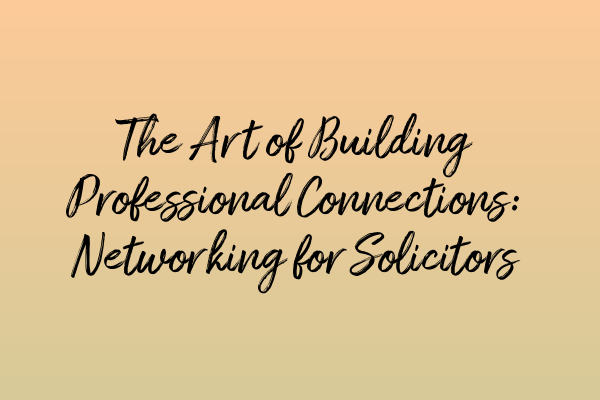The Art of Building Professional Connections: Networking for Solicitors
In the legal profession, building professional connections is essential for success. As a solicitor, your network of contacts can open doors, provide valuable insights, and even lead to new clients and career opportunities. However, networking can often be overlooked or undervalued in the pursuit of legal expertise. In this article, we will explore the art of building professional connections and provide practical tips for networking success.
1. Understand the Power of Networking
Networking is not just about exchanging business cards or attending events; it is about building genuine relationships and mutual trust. Your network should consist of individuals who can support, refer, and collaborate with you. By cultivating a strong network, you can tap into a wealth of knowledge, gain referrals, and establish yourself as a trusted professional in the legal community.
2. Take Advantage of Online Platforms
In today’s digital age, online platforms play a crucial role in networking. Social media platforms such as LinkedIn provide an opportunity to connect with legal professionals, share insights, and contribute to discussions. Ensure that your online profile is professional, up-to-date, and showcases your expertise in the legal field. Actively engage in online communities, participate in relevant legal discussions, and share valuable content to establish yourself as an authority in your area of expertise.
3. Attend Legal Events and Conferences
Attending legal events and conferences is an excellent way to meet fellow solicitors, barristers, and other legal professionals. These events offer opportunities for networking, learning from industry experts, and staying updated on the latest legal developments. Be proactive in introducing yourself, ask thoughtful questions during panel discussions, and follow up with new connections afterward. Remember to exchange business cards and make a note of key information to reference in future conversations.
4. Seek Mentorship
Mentorship is invaluable in the legal profession. A mentor can provide guidance, share their experiences, and introduce you to their network. Seek out experienced solicitors who are willing to offer advice and guidance. Look for mentorship programs offered by professional organizations or chambers of commerce. Having a mentor can accelerate your professional growth and open doors to new opportunities.
5. Engage in Continuing Professional Development (CPD)
Continuing Professional Development (CPD) programs provide an opportunity to expand your knowledge, enhance your skills, and build connections with other legal professionals. Attend relevant CPD events, seminars, and workshops to stay up-to-date with changes in the law and engage with like-minded individuals. CPD events often provide opportunities for informal networking during breaks, so make the most of those moments to connect with your peers.
6. Give Back to the Legal Community
Networking is not just about receiving; it is also about giving back. Consider sharing your expertise through writing articles, speaking at legal conferences, or offering pro bono services. By giving back to the legal community, you establish yourself as an asset and a trusted resource. This altruistic approach can lead to stronger connections and increased opportunities for collaboration.
In conclusion, networking is a critical skill for solicitors looking to excel in their careers. Building professional connections takes time, effort, and a genuine interest in others. By utilizing online platforms, attending legal events, seeking mentorship, engaging in CPD, and giving back to the legal community, you can create a strong network that will support your professional growth. So, embrace the art of networking and unlock the potential for success in the legal profession.
Related Articles:
– [Private Prosecutions: Exploring Non-Governmental Prosecutions in Criminal Cases](https://criminal-practice-law-sqe.co.uk/private-prosecutions-exploring-non-governmental-prosecutions-in-criminal-cases/)
– [Rights of the Accused: Protecting Individual Liberties in Criminal Proceedings](https://criminal-practice-law-sqe.co.uk/rights-of-the-accused-protecting-individual-liberties-in-criminal-proceedings/)
– [Magistrates’ Court vs Crown Court: Understanding Key Differences](https://criminal-practice-law-sqe.co.uk/magistrates-court-vs-crown-court-understanding-key-differences/)
– [Protecting Vulnerable Witnesses in Criminal Trials: Best Practices and Legal Safeguards](https://criminal-practice-law-sqe.co.uk/protecting-vulnerable-witnesses-in-criminal-trials-best-practices-and-legal-safeguards/)
– [Unraveling the Complexities of UK Bail Laws](https://criminal-practice-law-sqe.co.uk/unraveling-the-complexities-of-uk-bail-laws/)


Leave a Reply